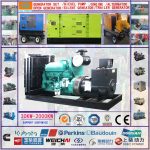Diesel Generator for Product Validation A Comprehensive Guide

Introduction
In the world of product development and validation, having a reliable power source is crucial to ensure the successful testing and validation of various products. One such power source that has been widely used for product validation is the diesel generator. Diesel generators are known for their robustness, efficiency, and reliability, making them an ideal choice for powering various testing equipment and processes during product validation. In this article, we will delve into the details of diesel generators, their benefits, applications in product validation, and best practices for using them effectively.
Understanding Diesel Generators
Diesel generators are a type of backup power system that uses a diesel engine to generate electricity. They are commonly used in industrial, commercial, and residential settings to provide a reliable source of power in case of grid outages or in locations where grid power is not available. Diesel generators consist of a diesel engine connected to an alternator, which converts mechanical energy into electrical energy. The diesel engine drives the alternator, which produces electricity that can be used to power various electrical devices and equipment.
Benefits of Diesel Generators
There are several key benefits of using diesel generators for product validation:
1. Reliability: Diesel generators are known for their reliability and durability. They can provide continuous power for extended periods without the need for frequent maintenance or refueling, making them ideal for powering testing equipment during product validation processes.
2. Fuel Efficiency: Diesel engines are more fuel-efficient compared to gasoline engines, which means that diesel generators can provide more power for a longer duration using less fuel. This makes them a cost-effective choice for powering testing equipment during product validation.
3. High Power Output: Diesel generators are capable of providing high power output, making them suitable for powering a wide range of testing equipment and processes during product validation. They can easily handle the power requirements of various testing procedures, ensuring smooth and uninterrupted operation.
4. Easy Maintenance: Diesel generators are relatively easy to maintain, with fewer moving parts compared to other types of generators. Routine maintenance tasks such as oil changes and filter replacements can be performed easily, ensuring the longevity and optimal performance of the generator.
Applications of Diesel Generators in Product Validation
Diesel generators find a wide range of applications in product validation across various industries. Some common applications include:
1. Testing of Electrical Equipment: Diesel generators are often used to power electrical testing equipment such as oscilloscopes, power analyzers, and signal generators during the validation of electrical products. The stable power output of diesel generators ensures accurate and reliable test results.
2. Environmental Testing: Product validation often involves subjecting products to extreme environmental conditions such as temperature, humidity, and vibration. Diesel generators can provide the necessary power to simulate these conditions in environmental test chambers and ensure that products meet the required standards.
3. Performance Testing: Diesel generators are used to power performance testing equipment such as dynamometers, load banks, and torque meters to evaluate the performance characteristics of products under different load conditions. The high power output of diesel generators allows for precise and controlled testing procedures.
4. On-Site Testing: In situations where grid power is unavailable or unreliable, diesel generators can be used for on-site product validation testing. Mobile diesel generators can be transported to remote locations or temporary testing sites to provide the required power for testing equipment.
Best Practices for Using Diesel Generators in Product Validation
To ensure the effective and safe use of diesel generators for product validation, it is important to follow best practices:
1. Sizing: Select a diesel generator that is appropriately sized to meet the power requirements of the testing equipment and processes involved in product validation. An undersized generator may not be able to provide sufficient power, while an oversized generator can lead to inefficiencies and increased fuel consumption.
2. Maintenance: Regular maintenance of the diesel generator is essential to ensure its optimal performance and longevity. Follow 500KW Diesel Generator For Sale for routine maintenance tasks such as oil changes, filter replacements, and inspection of critical components.
3. Fuel Quality: Use high-quality diesel fuel that meets the specifications recommended by the generator manufacturer. Contaminated or low-quality fuel can lead to engine problems and reduced performance. Consider using fuel additives to improve fuel quality and prevent issues such as microbial growth and fuel degradation.
4. Ventilation: Proper ventilation is essential when operating a diesel generator indoors or in enclosed spaces. Diesel engines produce exhaust gases that contain harmful pollutants such as carbon monoxide, so ensure adequate ventilation to prevent the buildup of exhaust fumes and ensure the safety of personnel.
5. Load Testing: Periodically conduct load testing of the diesel generator to verify its performance under different load conditions. Load testing helps identify any potential issues with the generator and ensures that it can provide the required power output for product validation processes.
6. Emergency Preparedness: Develop an emergency response plan in case of generator failure or other unforeseen events during product validation testing. Have backup power sources available to ensure continuity of testing operations and minimize downtime.

Conclusion
Diesel generators play a crucial role in powering testing equipment and processes during product validation across various industries. Their reliability, fuel efficiency, and high power output make them an ideal choice for ensuring uninterrupted and accurate testing procedures. By following best practices for using diesel generators, companies can maximize the efficiency and effectiveness of product validation processes and ultimately deliver high-quality products to the market.
